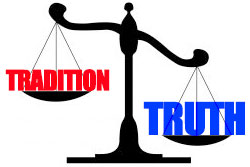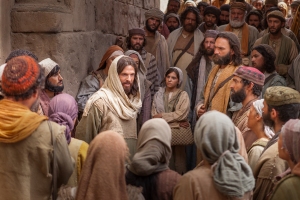I came across a question of Catholic Answers that apologist Tom Nash attempted to answer. Here is the question:
“I am seeking material that supports St. Clement of Alexandria’s belief in the Eucharist not as a metaphor. His writings seem to infer he did not believe in the true presence of Christ in the Eucharist.”
Nash responded by quoting a portion of Clement’s writing where he presumed the impression came from. Then he simply posted another quote from Clement as if that was satisfactory. He essentially said, here is what Clement said in a different place, now go along and stop asking silly questions.
I guess we can’t blame Nash for doing that since it is his job to retain Catholics, not lose them. If he were to engage in the context of Clement’s writings, he would most certainly find himself backed into a corner with no way out.
When he challenged my article, “Early Church Evidence Refutes Real Presence,” he did so using information exclusively drawn from tracts on the Catholic Answers website. My counter response was to write three in-depth articles on Ignatius, Justin and Irenaeus. To this, Nash had nothing to say but to point his readers, once again, to the tracts on the website.
It was blaringly obvious to me that Nash had no understanding or need of the early church writings, except to use them as propaganda. The person asking the question, presumably a Catholic, had obviously been reading something from Clement’s work that was persuading him or her to the opinion that Clement was not a proponent of the real presence doctrine. I’m convinced that Nash would not have known where to find that impression from Clement had he not been informed of my article.
In book one, chapter six of his work, The Instructor, Clement continually stresses the proclamation of the Gospel as the only food necessary for the soul.
Clement taught that the Word, that is, He who was from the beginning with God and who is God, is the source of nutrition to the believer in Christ. Christ is the Word and source of our nutriment. He is the Vine and we are the branches. We receive no nutriment or bear any fruit unless we abide in the Vine. Clement further taught that the way we receive the nutriment of the Word, is through the proclamation of the Gospel.
“We may regard the proclamation of the Gospel, which is universally diffused, as milk; and as meat, faith, which from instruction is compacted into a foundation, which, being more substantial than hearing, is likened to meat and assimilates to the soul itself, nourishment of this kind.”
This parallels with Paul’s analogy of the foundation upon which the church is built. He said the foundation was the apostles, prophets and Christ Jesus as the cornerstone. We, as living stones, are built up together for a dwelling place for God in spirit, i.e., His temple. Out nourishment is the Word Himself, and the means by which we receive the Word is through the Gospel.
Clement illustrated how Jesus used the metaphor of consuming His flesh and blood the same as Paul used milk and meat to convey our spiritual nutriment.
“Elsewhere the Lord, in the Gospel according to John, brought this out by symbols, when He said: Eat my flesh, and drink my blood; describing distinctly by metaphor the drinkable properties of faith and the promise.”
He said this concurrently with the above quote. So the “this” he is referring to is the milk and meat through the proclamation of the Gospel. He said it was a description by Jesus that was presented distinctly by metaphor to describe the drinkable properties of faith. He knew this to be true because Jesus explained that the words He spoke were spirit and life.
The bread of life discourse itself was a distinction between carnal nutriment and Spiritual nutriment. There were those at the discourse who could not see past the carnal because they didn’t believe in Jesus. Clement picked up on this as well.
“Salvation, accordingly, is the following of Christ: For that which is in Him is life. Verily, verily, I say unto you, He that hears My words, and believes in Him that sent Me, has eternal life, and comes not into condemnation, but has passed from death to life.’ Thus believing alone, and regeneration, is perfection in life; for God is never weak.”
The biblical quote is from John 5:24, and Clement uses it as a lead-in to show that salvation is solely the product of faith, which can also be derived from the bread of life discourse.
“Now the Lord Himself has most clearly revealed the equality of salvation, when He said: For this is the will of my Father, that every one that sees the Son, and believes in Him, should have everlasting life; and I will raise him up in the last day.’ As far as possible in this world, which is what he means by the last day, and which is preserved till the time that it shall end, we believe that we are made perfect. Wherefore He says, He that believes in the Son has everlasting life. If, then, those who have believed have life, what remains beyond the possession of eternal life? Nothing is wanting to faith, as it is perfect and complete in itself. If anything is wanting to it, it is not wholly perfect.”
Clement proclaims loud and clear that faith in Jesus alone is the means of salvation. Most Catholics don’t know this because it’s never presented to them, and the ones who do don’t want the rest to know. What they do present, however, are quotes like the following:
“Eat my flesh, He says, and drink my blood. Such is the suitable food which the Lord ministers, and He offers His flesh and pours forth His blood, and nothing is wanting for the children’s growth.”
That is a Catholic apologist’s use of early church writings. Anything that sounds like it might support Catholic doctrine is used with no regard for context. Coincidentally, this quote comes from the same book and chapter from which the above quotes were taken. How then could one reconcile the idea that Clement was suggesting that the suitable food is the eucharist when one reads the context of the work?
It’s easy to cherry-pick quotes out of context, and even easier to accept them as proof because it makes one feel as though the early church writers support their beliefs. It’s lazy, pure and simple. It’s lazy on the part of the one who accepts it, and it’s deceitful on the part of the one who provides it.
Keep in mind that the Catholic Church teaches that receiving the eucharist is essential for salvation. Clement does not. Rather, Clement taught that Gospel instruction nourishes up to eternal life. See for yourself…
“Wherefore also I have given you milk to drink, he [Paul: 1Cor. 3:2] says; meaning, I have instilled into you the knowledge which, from instruction, nourishes up to life eternal. But the expression, I have given you to drink, is the symbol of perfect appropriation. For those who are full-grown are said to drink, babes to suck. For my blood, says the Lord, is true drink. In saying, therefore, I have given you milk to drink, has he not indicated the knowledge of the truth, the perfect gladness in the Word, who is the milk?”
As much as Catholic apologists like to point out that Jesus’ blood it true drink, you will never find this quote on a Catholic website. The nutrient is knowledge, and instruction is the conduit and eternal life is the result. The Lord’s blood as true drink truly symbolizes the actual spiritual nutrition from Christ the Vine that leads to eternal life. Like that of milk and meat, the Lord’s blood is another metaphor for Gospel instruction. As Clement said previously, the Lord was describing, distinctly by metaphor, the drinkable properties of faith and promise.
And what of the cherry-picked quote that sound so authentically Catholic? Well, try reading it in context. Not just the context around it, but the entire context of Clement’s lesson. The quote below gives the entire stance from which it is taken. When reading it, keep in mind that the “milk” didn’t suddenly change meaning. The nourishment didn’t suddenly become the eucharist. In fact, Clement made no reference to the eucharist in the entire lesson. Not once did he make a connection between the bread of life discourse, which he referenced several times, and the eucharist. Not one time!
“And calling her children to her, she nurses them with holy milk, viz., with the Word for childhood. Therefore she had not milk; for the milk was this child fair and comely, the body of Christ, which nourishes by the Word the young brood, which the Lord Himself brought forth in throes of the flesh, which the Lord Himself swathed in His precious blood. O amazing birth! O holy swaddling bands! The Word is all to the child, both father and mother and tutor and nurse. Eat my flesh, He says, and drink my blood. Such is the suitable food which the Lord ministers, and He offers His flesh and pours forth His blood, and nothing is wanting for the children’s growth. O amazing mystery! We are enjoined to cast off the old and carnal corruption, as also the old nutriment, receiving in exchange another new regimen, that of Christ, receiving Him if we can, to hide Him within; and that, enshrining the Savior in our souls, we may correct the affections of our flesh.”
It takes a true ideologue to read Clement and conclude that he supported the Catholic doctrine of real presence. The truth is that his writings refute the catholic doctrine of real presence. Clement clearly believed in salvation by faith alone. He believed that our spiritual nutrition comes from knowledge in Christ through the proclamation of the Gospel, like branches to the Vine. The mystery isn’t transubstantiation, it’s spiritual growth through knowledge. But I guess those without knowledge must have their own mysteries, and they are plentiful.




 Posted by Brian Culliton
Posted by Brian Culliton  From the Catholic Answers website:
From the Catholic Answers website:
 In part one of my response to Tom Nash, I answered to his claims regarding Ignatius of Antioch. Here, in part two, I will address his claims regarding Justin Martyr.
In part one of my response to Tom Nash, I answered to his claims regarding Ignatius of Antioch. Here, in part two, I will address his claims regarding Justin Martyr.

 I came across the blog of Catholic apologist and author, Steve Ray, where I found this question from one of his visitors, Wade Fowler, on March 11, 2015:
I came across the blog of Catholic apologist and author, Steve Ray, where I found this question from one of his visitors, Wade Fowler, on March 11, 2015:

